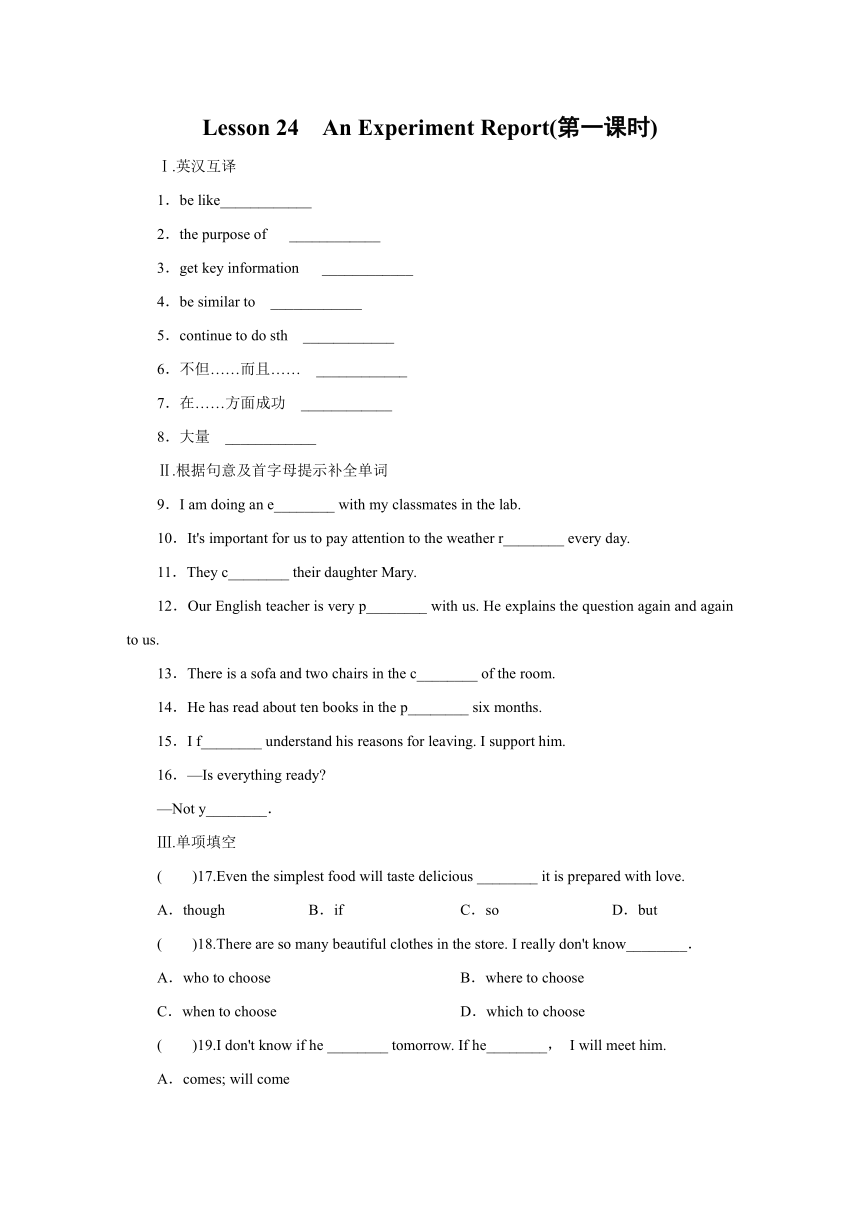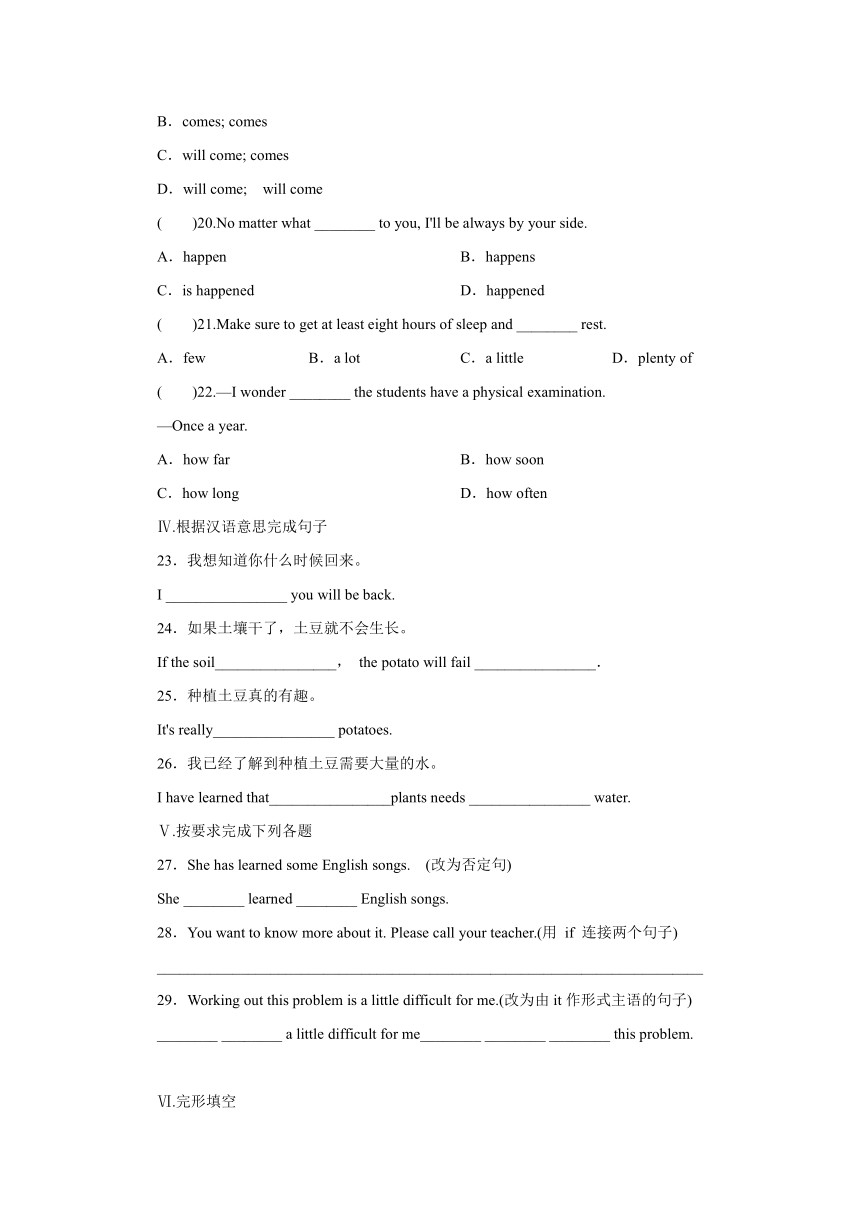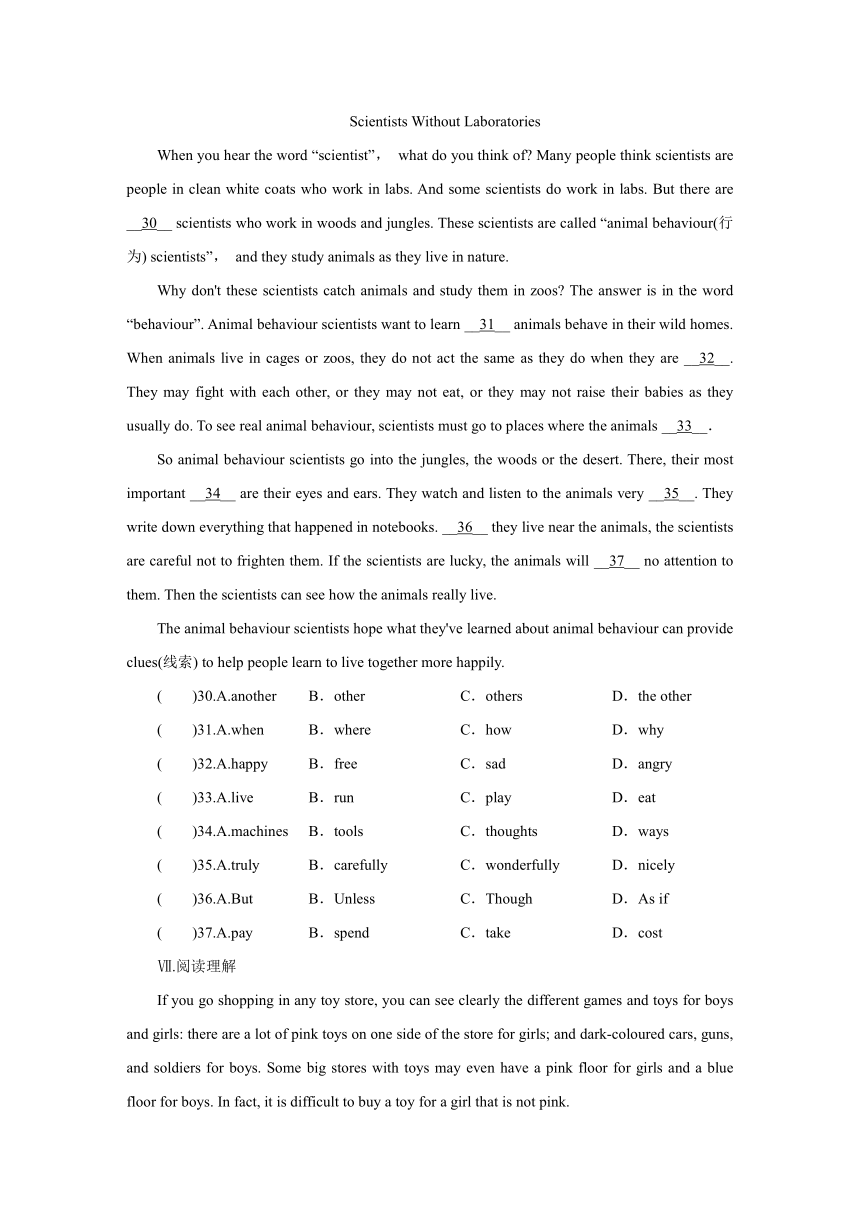Unit 8 Discoveries Lesson 24 An Experiment Report(第一课时)同步课时练习(word版,含答案)
文档属性
| 名称 | Unit 8 Discoveries Lesson 24 An Experiment Report(第一课时)同步课时练习(word版,含答案) |

|
|
| 格式 | docx | ||
| 文件大小 | 27.7KB | ||
| 资源类型 | 教案 | ||
| 版本资源 | 北师大版 | ||
| 科目 | 英语 | ||
| 更新时间 | 2022-05-02 09:45:24 | ||
图片预览



文档简介
Lesson 24 An Experiment Report(第一课时)
Ⅰ.英汉互译
1.be like____________
2.the purpose of ____________
3.get key information ____________
4.be similar to ____________
5.continue to do sth ____________
6.不但……而且…… ____________
7.在……方面成功 ____________
8.大量 ____________
Ⅱ.根据句意及首字母提示补全单词
9.I am doing an e________ with my classmates in the lab.
10.It's important for us to pay attention to the weather r________ every day.
11.They c________ their daughter Mary.
12.Our English teacher is very p________ with us. He explains the question again and again to us.
13.There is a sofa and two chairs in the c________ of the room.
14.He has read about ten books in the p________ six months.
15.I f________ understand his reasons for leaving. I support him.
16.—Is everything ready
—Not y________.
Ⅲ.单项填空
( )17.Even the simplest food will taste delicious ________ it is prepared with love.
A.though B.if C.so D.but
( )18.There are so many beautiful clothes in the store. I really don't know________.
A.who to choose B.where to choose
C.when to choose D.which to choose
( )19.I don't know if he ________ tomorrow. If he________, I will meet him.
A.comes; will come
B.comes; comes
C.will come; comes
D.will come; will come
( )20.No matter what ________ to you, I'll be always by your side.
A.happen B.happens
C.is happened D.happened
( )21.Make sure to get at least eight hours of sleep and ________ rest.
A.few B.a lot C.a little D.plenty of
( )22.—I wonder ________ the students have a physical examination.
—Once a year.
A.how far B.how soon
C.how long D.how often
Ⅳ.根据汉语意思完成句子
23.我想知道你什么时候回来。
I ________________ you will be back.
24.如果土壤干了,土豆就不会生长。
If the soil________________, the potato will fail ________________.
25.种植土豆真的有趣。
It's really________________ potatoes.
26.我已经了解到种植土豆需要大量的水。
I have learned that________________plants needs ________________ water.
Ⅴ.按要求完成下列各题
27.She has learned some English songs. (改为否定句)
She ________ learned ________ English songs.
28.You want to know more about it. Please call your teacher.(用 if 连接两个句子)
________________________________________________________________________
29.Working out this problem is a little difficult for me.(改为由it作形式主语的句子)
________ ________ a little difficult for me________ ________ ________ this problem.
Ⅵ.完形填空
Scientists Without Laboratories
When you hear the word “scientist”, what do you think of Many people think scientists are people in clean white coats who work in labs. And some scientists do work in labs. But there are __30__ scientists who work in woods and jungles. These scientists are called “animal behaviour(行为) scientists”, and they study animals as they live in nature.
Why don't these scientists catch animals and study them in zoos The answer is in the word “behaviour”. Animal behaviour scientists want to learn __31__ animals behave in their wild homes. When animals live in cages or zoos, they do not act the same as they do when they are __32__. They may fight with each other, or they may not eat, or they may not raise their babies as they usually do. To see real animal behaviour, scientists must go to places where the animals __33__.
So animal behaviour scientists go into the jungles, the woods or the desert. There, their most important __34__ are their eyes and ears. They watch and listen to the animals very __35__. They write down everything that happened in notebooks. __36__ they live near the animals, the scientists are careful not to frighten them. If the scientists are lucky, the animals will __37__ no attention to them. Then the scientists can see how the animals really live.
The animal behaviour scientists hope what they've learned about animal behaviour can provide clues(线索) to help people learn to live together more happily.
( )30.A.another B.other C.others D.the other
( )31.A.when B.where C.how D.why
( )32.A.happy B.free C.sad D.angry
( )33.A.live B.run C.play D.eat
( )34.A.machines B.tools C.thoughts D.ways
( )35.A.truly B.carefully C.wonderfully D.nicely
( )36.A.But B.Unless C.Though D.As if
( )37.A.pay B.spend C.take D.cost
Ⅶ.阅读理解
If you go shopping in any toy store, you can see clearly the different games and toys for boys and girls: there are a lot of pink toys on one side of the store for girls; and dark coloured cars, guns, and soldiers for boys. Some big stores with toys may even have a pink floor for girls and a blue floor for boys. In fact, it is difficult to buy a toy for a girl that is not pink.
Some people think that too much pink is bad for girls. Sue Palmer, writer of Toxic Childhood, is very worried that most girls over the age of three are crazy about the colour. According to some scientists, this happens for two reasons. Firstly, most companies offer too many products in pink. Also, many parents think their little daughter looks cute in pink. Sue Palmer says that girls at this age cannot make proper decisions by themselves, but pink can affect(影响) the choices and the decisions they will make in the future.
Some parents are worried too, for example, Vanessa Holburn, thirty two, who has two girls under the age of four. Their bedrooms are a sea of pink and Vanessa is not happy. “Pink says that you are soft and gentle. Blue says that you are strong and powerful. I want my daughters to be strong and powerful. I'm worried that pink will not help them with that,” she says.
But not everyone thinks there's something wrong with pink. Grayson Turner is a father of three girls and he isn't worried at all. “People forget that things change all the time,” he says. “My girls used to love pink when they were little, but as they get older, they change.” Turner explains that his twelve year old daughter never wears pink clothes any more. “This love of pink is just a fashion and all fashions change,” he adds. “It's only since the 1940s that people have started dressing girls in pink—before that it was a colour for boys.”
( )38.The underlined word “that” in Paragraph 3 means ________.
A.being soft and gentle
B.being strong and powerful
C.being gentle but powerful
D.being cute and beautiful
( )39.According to Grayson Turner, ________.
A.parents needn't worry about pink toys
B.all little kids love the colour pink
C.pink has always been a colour for girls
D.his girls now prefer the colour blue
( )40.The purpose of this passage is to ________.
A.explain why girls are crazy about the colour pink
B.make parents less worried about the colour pink
C.encourage girls to give up playing with pink toys
D.show people's different opinions about the colour pink
答案
Ⅰ.1.像 2.……的目的
3.获得关键信息 4.与……相似
5.继续做某事 6.not only…but also…
7.succeed in 8.plenty of/lots of
Ⅱ.9.experiment 10.report 11.call/called
12.patient 13.centre
14.past 15.fully 16.yet
Ⅲ.17.B 18.D 19.C 20.B 21.D
22.D 宾语从句之连接词。how far意为“多远”,对距离提问;how soon意为“多久之后”,对将来时态中“in+时间段”提问;how long意为“多久”,对for/since引导的时间状语或从句提问;how often意为“多久一次”,对频率提问。由答语“Once a year.”可知,上句谈论的是“频率”,应用how often连接宾语从句。
Ⅳ.23.wonder when/want to know when
24.is dry, to grow 25.interesting to grow
26.growing potato, plenty/lots of
Ⅴ.27.hasn't, any
28.If you want to know more about it, please call your teacher.
29.It is, to work out
Ⅵ.30.B another 表示“再一,又一”,后跟单数可数名词;other表示“另外的,其他的,别的”,后跟复数可数名词;others 表示“除去一部分以后的另一些,而不是剩下的全体”,为代词,其后不跟名词;the other 表示“两者中的另一个”;常构成“one…the other…”结构。
31.C 32.B 33.A 34.B 35.B 36.C
37.A pay attention to…为固定搭配,意为“注意……”。
Ⅶ.[主旨大意] 本文是一篇议论文,讨论了关于粉红色对女孩影响的不同观点。
38.B 代词指代题。根据第三段中“Blue says that you are strong and powerful. I want my daughters to be strong and powerful.”可知,这位妈妈认为蓝色意味着坚强有力,希望女儿成为坚强有力的人,担心粉色不会帮助女儿成为那样的人。故that指代“being strong and powerful”。
39.A 细节理解题。根据最后一段中“This love of pink is just a fashion and all fashions change”可知,Turner认为家长无须为粉色玩具担心,他以自己的女儿为例告诉大家人是会变的,时尚也会变的。
40.D 主旨大意题。根据文章四个段落中每个段落的主题句(每段第一句)可知,本文主要讲述人们对于粉色对女孩影响的不同观点。因此选D。
Ⅰ.英汉互译
1.be like____________
2.the purpose of ____________
3.get key information ____________
4.be similar to ____________
5.continue to do sth ____________
6.不但……而且…… ____________
7.在……方面成功 ____________
8.大量 ____________
Ⅱ.根据句意及首字母提示补全单词
9.I am doing an e________ with my classmates in the lab.
10.It's important for us to pay attention to the weather r________ every day.
11.They c________ their daughter Mary.
12.Our English teacher is very p________ with us. He explains the question again and again to us.
13.There is a sofa and two chairs in the c________ of the room.
14.He has read about ten books in the p________ six months.
15.I f________ understand his reasons for leaving. I support him.
16.—Is everything ready
—Not y________.
Ⅲ.单项填空
( )17.Even the simplest food will taste delicious ________ it is prepared with love.
A.though B.if C.so D.but
( )18.There are so many beautiful clothes in the store. I really don't know________.
A.who to choose B.where to choose
C.when to choose D.which to choose
( )19.I don't know if he ________ tomorrow. If he________, I will meet him.
A.comes; will come
B.comes; comes
C.will come; comes
D.will come; will come
( )20.No matter what ________ to you, I'll be always by your side.
A.happen B.happens
C.is happened D.happened
( )21.Make sure to get at least eight hours of sleep and ________ rest.
A.few B.a lot C.a little D.plenty of
( )22.—I wonder ________ the students have a physical examination.
—Once a year.
A.how far B.how soon
C.how long D.how often
Ⅳ.根据汉语意思完成句子
23.我想知道你什么时候回来。
I ________________ you will be back.
24.如果土壤干了,土豆就不会生长。
If the soil________________, the potato will fail ________________.
25.种植土豆真的有趣。
It's really________________ potatoes.
26.我已经了解到种植土豆需要大量的水。
I have learned that________________plants needs ________________ water.
Ⅴ.按要求完成下列各题
27.She has learned some English songs. (改为否定句)
She ________ learned ________ English songs.
28.You want to know more about it. Please call your teacher.(用 if 连接两个句子)
________________________________________________________________________
29.Working out this problem is a little difficult for me.(改为由it作形式主语的句子)
________ ________ a little difficult for me________ ________ ________ this problem.
Ⅵ.完形填空
Scientists Without Laboratories
When you hear the word “scientist”, what do you think of Many people think scientists are people in clean white coats who work in labs. And some scientists do work in labs. But there are __30__ scientists who work in woods and jungles. These scientists are called “animal behaviour(行为) scientists”, and they study animals as they live in nature.
Why don't these scientists catch animals and study them in zoos The answer is in the word “behaviour”. Animal behaviour scientists want to learn __31__ animals behave in their wild homes. When animals live in cages or zoos, they do not act the same as they do when they are __32__. They may fight with each other, or they may not eat, or they may not raise their babies as they usually do. To see real animal behaviour, scientists must go to places where the animals __33__.
So animal behaviour scientists go into the jungles, the woods or the desert. There, their most important __34__ are their eyes and ears. They watch and listen to the animals very __35__. They write down everything that happened in notebooks. __36__ they live near the animals, the scientists are careful not to frighten them. If the scientists are lucky, the animals will __37__ no attention to them. Then the scientists can see how the animals really live.
The animal behaviour scientists hope what they've learned about animal behaviour can provide clues(线索) to help people learn to live together more happily.
( )30.A.another B.other C.others D.the other
( )31.A.when B.where C.how D.why
( )32.A.happy B.free C.sad D.angry
( )33.A.live B.run C.play D.eat
( )34.A.machines B.tools C.thoughts D.ways
( )35.A.truly B.carefully C.wonderfully D.nicely
( )36.A.But B.Unless C.Though D.As if
( )37.A.pay B.spend C.take D.cost
Ⅶ.阅读理解
If you go shopping in any toy store, you can see clearly the different games and toys for boys and girls: there are a lot of pink toys on one side of the store for girls; and dark coloured cars, guns, and soldiers for boys. Some big stores with toys may even have a pink floor for girls and a blue floor for boys. In fact, it is difficult to buy a toy for a girl that is not pink.
Some people think that too much pink is bad for girls. Sue Palmer, writer of Toxic Childhood, is very worried that most girls over the age of three are crazy about the colour. According to some scientists, this happens for two reasons. Firstly, most companies offer too many products in pink. Also, many parents think their little daughter looks cute in pink. Sue Palmer says that girls at this age cannot make proper decisions by themselves, but pink can affect(影响) the choices and the decisions they will make in the future.
Some parents are worried too, for example, Vanessa Holburn, thirty two, who has two girls under the age of four. Their bedrooms are a sea of pink and Vanessa is not happy. “Pink says that you are soft and gentle. Blue says that you are strong and powerful. I want my daughters to be strong and powerful. I'm worried that pink will not help them with that,” she says.
But not everyone thinks there's something wrong with pink. Grayson Turner is a father of three girls and he isn't worried at all. “People forget that things change all the time,” he says. “My girls used to love pink when they were little, but as they get older, they change.” Turner explains that his twelve year old daughter never wears pink clothes any more. “This love of pink is just a fashion and all fashions change,” he adds. “It's only since the 1940s that people have started dressing girls in pink—before that it was a colour for boys.”
( )38.The underlined word “that” in Paragraph 3 means ________.
A.being soft and gentle
B.being strong and powerful
C.being gentle but powerful
D.being cute and beautiful
( )39.According to Grayson Turner, ________.
A.parents needn't worry about pink toys
B.all little kids love the colour pink
C.pink has always been a colour for girls
D.his girls now prefer the colour blue
( )40.The purpose of this passage is to ________.
A.explain why girls are crazy about the colour pink
B.make parents less worried about the colour pink
C.encourage girls to give up playing with pink toys
D.show people's different opinions about the colour pink
答案
Ⅰ.1.像 2.……的目的
3.获得关键信息 4.与……相似
5.继续做某事 6.not only…but also…
7.succeed in 8.plenty of/lots of
Ⅱ.9.experiment 10.report 11.call/called
12.patient 13.centre
14.past 15.fully 16.yet
Ⅲ.17.B 18.D 19.C 20.B 21.D
22.D 宾语从句之连接词。how far意为“多远”,对距离提问;how soon意为“多久之后”,对将来时态中“in+时间段”提问;how long意为“多久”,对for/since引导的时间状语或从句提问;how often意为“多久一次”,对频率提问。由答语“Once a year.”可知,上句谈论的是“频率”,应用how often连接宾语从句。
Ⅳ.23.wonder when/want to know when
24.is dry, to grow 25.interesting to grow
26.growing potato, plenty/lots of
Ⅴ.27.hasn't, any
28.If you want to know more about it, please call your teacher.
29.It is, to work out
Ⅵ.30.B another 表示“再一,又一”,后跟单数可数名词;other表示“另外的,其他的,别的”,后跟复数可数名词;others 表示“除去一部分以后的另一些,而不是剩下的全体”,为代词,其后不跟名词;the other 表示“两者中的另一个”;常构成“one…the other…”结构。
31.C 32.B 33.A 34.B 35.B 36.C
37.A pay attention to…为固定搭配,意为“注意……”。
Ⅶ.[主旨大意] 本文是一篇议论文,讨论了关于粉红色对女孩影响的不同观点。
38.B 代词指代题。根据第三段中“Blue says that you are strong and powerful. I want my daughters to be strong and powerful.”可知,这位妈妈认为蓝色意味着坚强有力,希望女儿成为坚强有力的人,担心粉色不会帮助女儿成为那样的人。故that指代“being strong and powerful”。
39.A 细节理解题。根据最后一段中“This love of pink is just a fashion and all fashions change”可知,Turner认为家长无须为粉色玩具担心,他以自己的女儿为例告诉大家人是会变的,时尚也会变的。
40.D 主旨大意题。根据文章四个段落中每个段落的主题句(每段第一句)可知,本文主要讲述人们对于粉色对女孩影响的不同观点。因此选D。
同课章节目录
- Unit 1 Language
- Lesson 1 Body Language
- Lesson 2 Different Kinds of Language
- Lesson 3 Language Learning Tips
- Communication Workshop
- Unit 2 Books
- Lesson 4 Classics
- Lesson 5 The Book Club
- Lesson 6 Tom Sawye
- Communication Workshop
- Unit 3 Creativity
- Lesson 7 A Famous Invento
- Lesson 8 Good or Bad?
- Lesson 9 Creative Minds
- Communication Workshop
- Unit 4 Space
- Lesson 10 Life in Space
- Lesson 11 The Amazing Shenzhou
- Lesson 12 The Spaceship
- Communication Workshop
- Unit 5 Literature
- Lesson 13 Anne of Green Gables
- Lesson 14 The Dark Room
- Lesson 15 A Famous Write
- Communication Workshop
- Unit 6 Role Models
- Lesson 16 Yao Ming
- Lesson 17 People in Our Lives
- Lesson 18 Steve Jobs
- Communication Workshop
- Unit 7 Journeys
- Lesson 19 The Silk Road
- Lesson 20 Life in a Journey
- Lesson 21 To the South Pole
- Communication Workshop
- Unit 8 Discoveries
- Lesson 22 Famous Discoveries
- Lesson 23 Discovery of the Yea
- Lesson 24 An Experiment Report
- Communication Workshop
- Unit 9 Save the Planet
- Lesson 25 Going Green
- Lesson 26 Our Rive
- Lesson 27 Tree Heroes
- Communication Workshop
